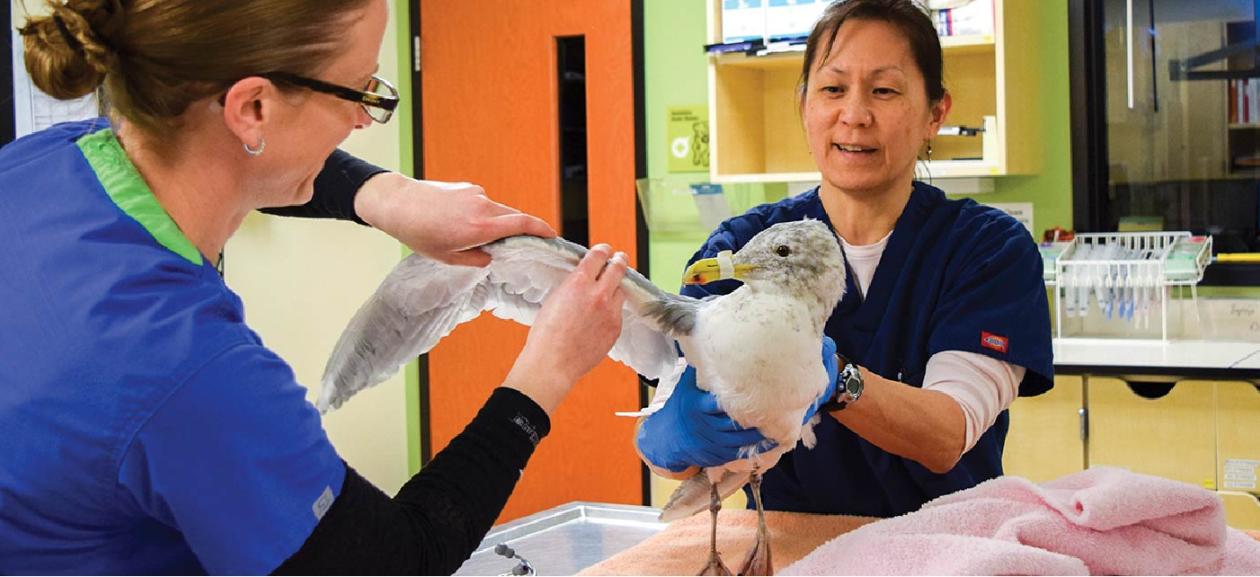
What to Do If You Find an Injured Stray or Wild Animal
DoveLewis doctors share tips for handling an animal in need of medical attention
PORTLAND, Ore. – As we approach the warmer summer months, DoveLewis Veterinary Emergency and Specialty Hospital sees an increase in injured stray animal and wildlife cases. Before attempting to rescue one of these animals, DoveLewis veterinarians suggest following the tips below to ensure that you remain safe and the injured animal receives the best treatment possible.
Thanks to the donor-funded Stray Animal & Wildlife Program, DoveLewis is able to cover the cost of providing emergency stabilization and care for hundreds of strays and wildlife each year. Last year, DoveLewis treated 1,535 stray and wild animals. Many of these injured animals are admitted by local shelters, police officers, firefighters and good Samaritans.
First and foremost, assess the safety of the situation. “If you see an animal that appears injured, think about your safety first,” said Dr. Lee Herold, chief medical officer at DoveLewis. “Make sure you are protected from the environment, like moving cars and running water, as well as the animal. If an animal is in pain and fearful, you never know how it will react.”
If you have any reservations about rescuing or handling a domestic stray animal, call your local county animal services. They will be able to safely transport the animal to DoveLewis or an animal rescue organization. However, if you find an injured wild animal or bird during regular business hours, always call the Audubon Society of Portland. They will assess the situation and either transport the animal themselves or give you further instruction. If you come across an injured animal in the evening or on the weekends, use your best judgment on whether the animal can be rescued and delivered to DoveLewis safely.
Determine if the animal is actually injured. Often times, stray domestic animals appear injured but are actually just fearful. If you see no obvious injuries or unhealthy behavior, take the animal to a nearby veterinarian to check for a microchip or drop him off at a local county shelter. (DoveLewis can only take injured animals.) Again, if the animal seems aggressive, call animal services instead for assistance.
Uninjured wildlife should never be touched. This applies to “abandoned” babies as well. Many baby animals, especially birds, may appear abandoned. But more often than not, these babies are being cared for by their parents, even if it’s not immediately obvious. Some bird species leave the nest and spend as many as two to five days on the ground before they can fly. During this time, the birds are learning vital life skills. So, unless an injury is visible and obvious, leaving them alone will give them the best chance of survival.
Cover and contain. If the animal is obviously injured and can be transported safely, find a towel, blanket or thick gloves to use while handling the animal. “You want to put as much of a barrier between you and the animal as possible. You still don’t know the personality of this animal or if you could catch anything that could make you sick,” said Dr. Ladan Mohammed-Zadeh, DoveLewis critical care specialist.
Place the animal in any available safe container – a carrier or a box is ideal. Make sure the animal is as comfortable as possible and secure in the container. Many animals, especially small ones, are stunned when injured and will fly or scurry away when they are more alert. Please remember, it is illegal (and unsafe for you and the injured animal) to attempt to rehabilitate a wild animal on your own.
After treatment at DoveLewis, stray animals are transferred to local shelters for further treatment, recovery and eventual adoption. Wild animals are transferred to local organizations that focus on rehabilitation and returning the animal it to its natural habitat.
###
Recent Posts
Marijuana Toxicity in Pets: What You Need to Know
As availability of marijuana increases in the Portland area since legalization, so have the number of marijuana toxicity cases treated at DoveLewis. Our doctors warn pet owners of the potential risks to their dogs and cats if marijuana is ingested in any form.
Dog Bite Prevention Tips
Now more than ever, people are venturing outside with their pets to get fresh air. This is increasing the possibility of interactions with other dogs that can lead to bites and injuries. DoveLewis is sharing tips to help prevent this from happening so animals and humans can stay safe.
How to Build a Pet First Aid Kit
Every pet owner should have a pet first aid kit handy in case of an emergency. If you need to put one together, we’ve got you covered!



